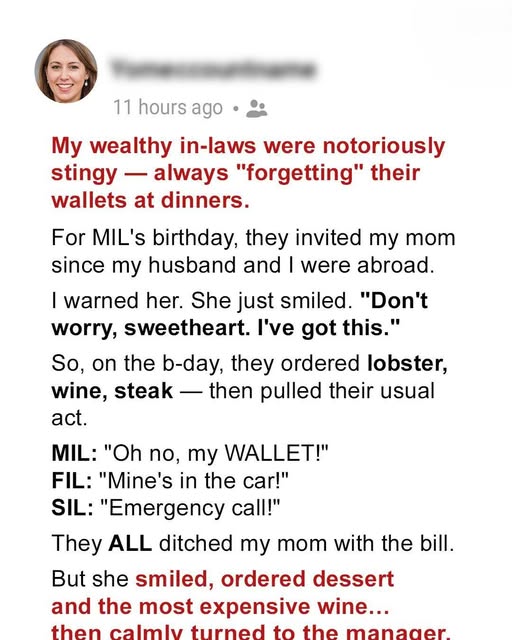My in-laws had a reputation, and everyone in the family knew exactly what it was. On the surface, they looked like the picture of elegance — wealthy, polished, always perfectly put together. The type of people who would never admit to reusing a napkin, let alone skipping out on a bill. But underneath all that glamour was a habit they’d turned into a family trademark: they simply never paid. Not if there was the slightest chance someone else might do it for them.
It didn’t matter where they were — a fancy steakhouse or a casual brunch spot. They would confidently order the priciest entrées, indulge in dessert and wine, charm everyone at the table… and then like clockwork, the moment the check arrived, they transformed into tragic victims of “wallet emergencies.” Misplaced cards. Forgotten purses. Sudden dashes to “check the car,” followed by complete and utter disappearance.
It was embarrassing. And it worked because most people hate conflict. Family especially tends to look away, smile through the discomfort, and pick up the bill. I watched this performance for years, always swallowing my frustration because confronting them felt like lighting a match in a room full of gas.
My husband hated it too, but to him it was normal — he’d grown up with it. He once told me, “My parents have never paid for a meal they didn’t physically host.” I thought it was an exaggeration. Unfortunately, it was the literal truth. They believed their presence alone was contribution enough.
So when my in-laws invited my mother to an upscale Italian restaurant for her birthday — while my husband and I were out of town — I knew exactly what was about to happen. Not because my mom was naive, but because she was the kindest, most generous person alive. Thirty years as a schoolteacher had made her incredibly patient, endlessly empathetic, and completely unwilling to assume bad intentions.
I warned her gently: “Mom… they disappear when the check comes.”
She smiled in that calm, knowing way of hers — the kind of smile that meant she already had a plan. “Sweetheart, I’ve dealt with much worse. Trust me.”
Still, I worried.
The next morning, over coffee, she told me what happened — and by the time she finished, I was speechless.
At first, dinner unfolded exactly as expected. My in-laws were overly sweet, overly invested in her life, raving dramatically about every dish, ordering without glancing at a single price. My mom noticed everything.
When dessert menus came out, the performance began. My father-in-law dramatically patted his pockets. My mother-in-law rummaged loudly through her purse. Then came the excuses, increasingly ridiculous:
“Oh dear, my card must be in my other purse!”
“I think I may have dropped my wallet somewhere!”
“Let me just run to the car!”
And one by one, they drifted toward the exit — and never came back.
Most people would panic being left with a $1,500 bill. My mother? She waved over the waiter with complete calm.
“I’ll have a tiramisu,” she said softly. “And would you mind asking the manager to stop by?”
A minute later, the manager appeared — a tall man in his thirties. He took one look at her and froze.
“Mrs. Delgado? Is that you?”
He had been one of her students twenty years earlier — a quiet boy who struggled with reading and spent countless afternoons getting extra help from her. My mom remembered him. He remembered her even more.
After catching up briefly, my mom explained what had happened — no drama, no judgment, just the truth.
The manager shook his head, already furious on her behalf. “Absolutely not,” he said. “Let me take care of this.”
He made a quick phone call. My mom didn’t know what he said — but the results were immediate.
Within minutes, my in-laws rushed back inside looking as if they’d sprinted through a hurricane — pale, sweaty, frantic, eyes darting everywhere.
The manager greeted them politely, too politely. He informed them that their bill was still open and needed to be paid — immediately. If not, he’d have no choice but to involve the authorities.
For the first time in their lives, my in-laws had no excuses. They simply handed over a credit card in silence and paid the entire $1,500.
My mother took her time finishing her tiramisu, thanked everyone graciously, and walked out with more dignity than money could ever buy.
The next morning, my mother-in-law called her with syrupy sweetness. “What a lovely dinner! And of course, we always pay our share.”
My mom didn’t bother correcting her. She just thanked her politely and went on with her day. No bragging. No gloating. She didn’t need to.
The message had landed.
At the very next family gathering, before anyone even sat down, my mother-in-law loudly announced, “Let’s all pay separately. It’s easier for everyone!”
No one argued. Everyone knew exactly why.
My in-laws didn’t change because they were confronted. They changed because — for the first time — someone stopped letting them get away with it. And the person who delivered the lesson didn’t raise her voice, didn’t humiliate them, didn’t make a scene. She simply let the truth reveal itself.
As my mom later said, “People show you who they are. Sometimes they just need a little help seeing it.”
And with one dessert and a smile, she ended a decades-long pattern of freeloading.
Real class doesn’t need to be loud. It just needs backbone. And my mom had plenty.
